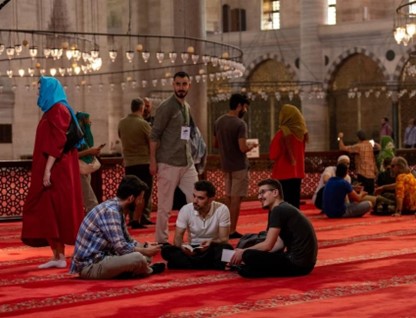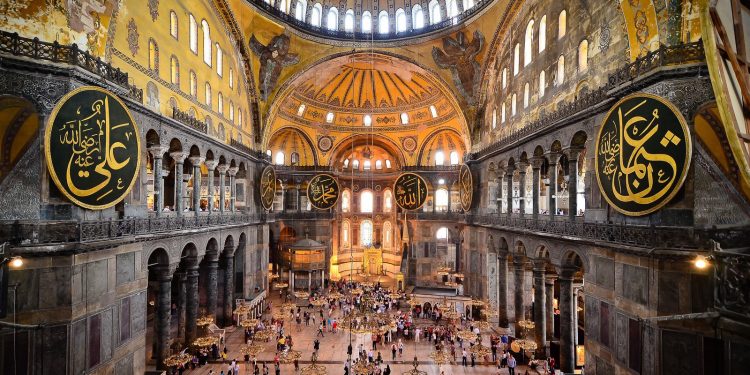In the enchanting labyrinth of Istanbul, where minarets pierce the sky, and the euphonious call to prayer reverberates through the ancient streets, a silent migration unfolds—a journey of souls seeking solace, enlightenment, and the warm embrace of Islam. This essay endeavors to explore the compelling phenomenon of migration to Istanbul by non-Muslims and converts to Islam, drawn by the desire to deepen their understanding of the faith or to practice it more freely. The illustrious city of Istanbul, steeped in the grandeur of its past as the capital of the Byzantine and Ottoman Empires, casts a spell upon all who walk its cobblestone streets. Its rich cultural and religious heritage, woven into the very fabric of its being, echoes through time in the majestic mosques, venerable madrasas, and hallowed historical sites that serve as beacons of Islamic learning and practice. Situated at the crossroads of Europe and Asia, Istanbul has emerged as a melting pot of cultures and ideologies, captivating seekers of spiritual knowledge from every corner of the globe.
The decision of non-Muslims and converts to Islam to migrate to Istanbul is driven by a myriad of compelling factors. Firstly, Istanbul offers unparalleled access to esteemed Islamic scholars, venerable institutions, and invaluable resources, creating an immersive learning environment for those eager to delve deeper into the teachings of the faith. Moreover, the city’s cosmopolitan ambiance fosters an atmosphere of inclusivity and tolerance, providing a sanctuary for individuals from diverse backgrounds to explore their spiritual journey without fear of discrimination or persecution. Furthermore, Istanbul’s historical significance as a bastion of Islamic civilization exerts a magnetic pull on those enchanted by the spiritual heritage of the Muslim world. The opportunity to immerse oneself in the resplendent tapestry of Islamic art, architecture, and culture serves as a catalyst for spiritual growth and self-discovery. Additionally, the vibrant Muslim community in Istanbul offers a supportive network for newcomers, extending a hand of guidance, companionship, and solidarity on their quest for religious enlightenment.
In the Western context, many individuals who embrace Islam find themselves navigating a cultural landscape that might be considered degenerate. In such environments, the practice of Islam can often be hindered by societal norms and influences that contradict the principles and values of the faith. Despite their sincere desire to live in accordance with Islamic teachings, these individuals may encounter challenges in maintaining their religious observance amidst a culture that glorifies excess and indulgence. As a result, they may seek refuge in places like Istanbul, where the rich Islamic heritage and supportive community provide a sanctuary for spiritual growth and fulfillment.
Throughout history, cities like Cairo, Damascus, and Madinah have served as primary attractions for those interested in Islamic knowledge and practice. Cairo, renowned for Al-Azhar University, has long held sway as a bastion of Islamic learning. However, following the military coup in 2014 and subsequent government intervention in the institution’s affairs, Al-Azhar has witnessed a decline in its reputation and popularity among seekers of Islamic knowledge. Similarly, the University of Madinah, once esteemed for its role in higher Islamic education, has faced challenges to its credibility. The Saudi Arabian government’s crackdown on prominent scholars and efforts to stifle dissent have tarnished the university’s reputation, causing many to question its integrity and independence. With its rich historical and cultural heritage, Damascus was another hub for Islamic learning. However, the ongoing conflict in Syria has disrupted its academic institutions and diminished its appeal to aspiring students of Islam. The devastation wrought by war has rendered Damascus less accessible and conducive to learning for newcomers. In contrast, Istanbul has emerged as a favored destination in recent years, attracting a growing number of seekers of Islamic knowledge. The city’s cosmopolitan atmosphere, coupled with its historical significance as a center of Islamic civilization, appeals to individuals from diverse backgrounds. Moreover, Istanbul’s relative stability and welcoming environment have made it an attractive option for those seeking refuge from political instability and conflict in other regions. The global appeal of the Hanafi school of thought, prevalent in Turkey, further enhances Istanbul’s allure as a destination for Islamic education. The compatibility of Hanafi jurisprudence with the temperament and preferences of the average person adds to its attractiveness as a place to deepen one’s understanding of Islam. Furthermore, Istanbul has become a hub for renowned Islamic scholars from around the world, including those displaced by conflicts in their home countries, such as Syria. Their presence contributes to the city’s vibrant intellectual and spiritual landscape, providing valuable guidance and mentorship to aspiring students of Islam. Hence, while traditional centers of Islamic learning like Cairo, Damascus, and Madinah continue to hold historical significance, Istanbul has emerged as a preferred destination for seekers of Islamic knowledge who have been affected by factors such as political instability, government intervention in academic institutions in the mentioned countries and the global appeal of the Hanafi school of thought.
Istanbul has increasingly become a favored city destination in recent years, capturing the interest of a growing number of science students.

Source: Intercultural Communicatiın Center
Experiences of Migrants
Over the last year, I have had the honor of working in the Center for Cross-Cultural Communication (KİM Vakfı) in Süleymaniye, Istanbul. During this time, I have interacted with new Muslims and individuals who have been interested in Islam for such a long time and noted the fact that the experiences of non-Muslims and converts to Islam who migrate to Istanbul are as diverse as they are profound. For many, the journey represents a profound personal and spiritual transformation as they navigate the complexities of adopting a new faith and integrating into a foreign society. Some individuals may encounter challenges such as language barriers, cultural differences, and social stigma, which can impact their sense of belonging and identity. Among the most common challenges faced by migrants are economic hardships, with some leaving countries with stronger currencies to pursue a closer connection with God, often making material sacrifices in the process. Many new Muslims have had to depart Istanbul midway through their journey due to financial constraints or a lack of stability and growth prospects. Additionally, navigating the migration system, which often involves arduous processes to obtain or renew residence permits, presents another significant hurdle for migrants.
However, despite these obstacles, many find solace and fulfillment in their newfound faith and community. The process of learning about Islam in Istanbul enables individuals to explore the teachings of the Quran and the traditions of the Prophet Muhammad (PBUH) in depth, fostering a deeper spiritual connection and sense of purpose. Moreover, the opportunity to experience the call to prayer five times a day and participate in communal prayers, religious rituals, and charitable activities enriches their spiritual journey and strengthens their bonds with fellow believers. At the heart of this experience lies the exceptionally welcoming, hospitable, sincere, and pure-hearted Turkish citizens, whose generosity knows no bounds. The Turkish fascination with converts to Islam comes as no surprise, given the country’s own intellectual evolution in modern history.
Implications for Individuals and Society
The migration of non-Muslims and converts to Islam to Istanbul holds profound implications for both individuals and broader society. On an individual level, the experience offers a pathway for spiritual growth, self-discovery, and personal fulfillment. By immersing themselves in the teachings and practices of Islam, migrants are able to cultivate a deeper understanding of their faith and forge meaningful connections with the Muslim community. Moreover, the migration
of individuals to Istanbul for religious purposes enriches the city’s cultural diversity and cosmopolitan ethos. As newcomers integrate into society, they bring with them unique perspectives, experiences, and talents that enrich the social, intellectual, and artistic landscape of Istanbul. This cultural exchange fosters dialogue, understanding, and mutual respect among people of different backgrounds, ultimately strengthening the social fabric of the city. Furthermore, the presence of non-Muslims and converts to Islam in Istanbul challenges prevailing stereotypes and misconceptions about Islam and Muslims. By engaging with the local community and participating in interfaith dialogue, migrants serve as ambassadors for their faith, promoting tolerance, coexistence, and pluralism in a globalized world. Their presence reflects the universal values of compassion, justice, and mercy espoused by Islam, transcending boundaries of nationality, ethnicity, and religion.
Conclusion
The migration of non-Muslims interested in Islam and new Muslims to Istanbul for the purpose of learning about Islam or practicing the faith reflects the city’s status as a global hub of Islamic learning and culture. By offering access to renowned scholars, institutions, vakıfs, and resources, Istanbul provides fertile ground for spiritual growth, self-discovery, and communal solidarity. The experiences of migrants underscore the transformative power of faith and the universal appeal of Islam as a source of guidance, inspiration, and hope. As individuals from diverse backgrounds come together in pursuit of spiritual enlightenment, they contribute to the cultural richness, social cohesion, and pluralistic ethos of Istanbul, embodying the timeless values of tolerance, understanding, and mutual respect.
Photograph: Hagia Sophia












































